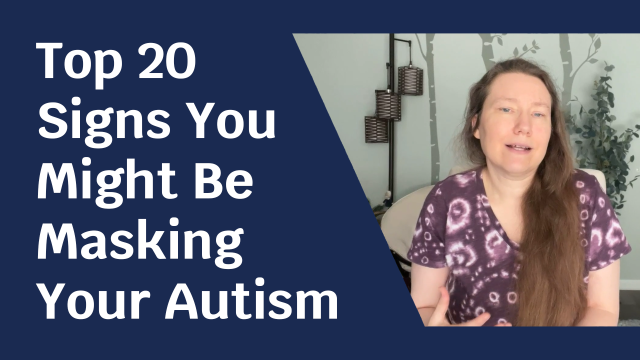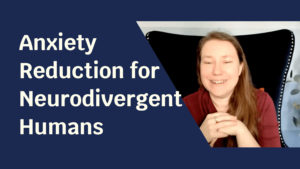
Are you masking?
Are you hiding your natural Autistic reactions from people? Maybe you’ve done that so much, for so long, that you don’t even notice anymore. Here are the top 20 signs that you might be masking your autism.
So, where do these top 20 signs come from? In November and December of 2022, mostly, I tweeted over 60 examples of everyday situations that might be signs that you’re masking your autism. These tweets were a hit for a while, and thousands of people commented, liked, and engaged with them, and I’ve been wanting to make a roundup of the top 20 ever since. Which is this!
What is Autistic masking? Masking are types of behaviors that hide our natural Autistic style of talking and acting so that we don’t get spotted as Autistic, or weird, or different, or a target for bullying, around other people. Or not as much.
Many of us learn to do this, with varying degrees of success, from an early age and get better at it as we get older and have more experience, because we get less flack from other people the more we mask or hide. When we do this extensively, to the point that it’s really hard to stop even when we’re alone, or when we get so used to it that it’s hard to tell when we’re doing it, or hard to tell anymore what our natural reactions would be, it’s sometimes called high masking.
This isn’t success however. It’s a sign that I am fighting my own nature.
This isn’t success however. It’s not an “autism cure” (there’s no such thing), and it’s not a compliment when people say “oh, I couldn’t tell that you’re autistic.” It’s a sign that I am fighting my own nature. And that takes an extraordinary amount of energy, it causes autistic burnout, high levels of stress, people avoidance, demand avoidance, it makes me more irritable and unpleasant to be around, and has all sorts of major physical and mental health effects. Which is what is leading a lot of adults, like I did, to figure out that they’re Autistic, because they can’t live with these effects anymore, and it’s why so many of us are slowly learning to unmask, to be more our natural selves.
By the way, any one of these taken individually is not necessarily a sign that you’re Autistic. And even a bunch of them could be a result of other things, like a history of heavily conformity-driven socialization, or high sensitivity, or trauma. Actually, that’s what’s going on here more than the autism, but it does seem to be quite common that the autistic brain tends to react to heavy socialization and people trauma in these particular ways.
And so, if these sound a little too familiar, and other things about the Autistic experience also seem familiar, it might be worth looking into more.
A quick note
Okay, last thing before we get to the top 20 signs of autistic masking.
In some of the originals, I used the phrase “you might be #HighMasking,” and later switched to “you might be masking your autism.” I like them both for different reasons, but there was a good argument made that some people took the “high masking,” as if it were a different type of autism, which it isn’t, it’s a range of learned behaviors, but thinking of it that way could create division in the autistic community, which isn’t my intent. So to streamline it here, I’m going to stick with just one, “you might be masking your autism.”
So, on to the signs. These are in order of how many agreements, engagements, and likes each of the original tweets received.
Top 20 signs
Number 20:
You might be masking your autism if you chat with strangers in elevators, even when you really don’t want to, to avoid coming across as rude to someone you will never see again.
Number 19:
You might be masking your autism if being around people feels like a performance, or like being “on.”
Number 18:
You might be masking your autism if routine emails cause significant worry, checking and rechecking, fretting over word choice and grammar, how it might be read, procrastination, and dread.
Number 17:
You might be masking your autism if you are late diagnosed and you think your family won’t believe that you’ve been suffering for years because they didn’t notice.
Number 16:
You might be masking your autism if you didn’t realize how many sensory sensitivities or sensory needs you have until you started questioning whether you’re autistic.
Number 15:
You might be masking your autism if everyone leaves the house and you feel like you can finally take a deep breath.
Number 14:
You might be masking your autism if you’re worried people won’t believe you when you tell them you need accommodations, because “you didn’t need them before.”
Number 13:
You might be masking your autism if you freeze, clam up, go blank, etc. when someone asks about a project that’s still in progress, or walks in on you when you’re working on it.
Number 12:
You might be masking your autism if you follow the conversational advice to ask about others as a way to keep the conversation away from you.
Number 11:
You might be masking your autism if you mentally divide people into “family,” “work friends,” “school friends,” “people I have to deal with,” and “random people.”
Number 10:
You might be masking your autism if someone offers you a drink and you desperately want it but say, “no thanks, I’m good.”
Number 9:
You might be masking your autism if you have one thing scheduled in the day and it feels like the whole day is shot.
Number 8:
You might be masking your autism if you seem on paper like you’re doing well in life, but are always struggling with commonplace tasks.
Number 7:
You might be masking your autism if the doorbell ringing triggers immediate panic, moving into grief over your lost alone time, and then resignation to unexpected people time.
Number 6:
You might be masking your autism if you’re constantly worried you’ll get fired, or people will hate you, or that people will react badly, for every tiny thing you do, even when you know that’s not likely.
Number 5:
Masking makes autism a sort of ‘friendly disability,’ where I suffer so my friend (etc.) doesn’t have to. I go out of my way to be “not a problem,” so others aren’t inconvenienced. It’s exhausting.
Number 4:
You might be masking your autism if someone asks you what you need/want and you genuinely have no idea.
Number 3:
You might be masking your autism if you’re walking down the street and mentally measure how far you are from a stranger you’re passing to gauge when to smile and nod politely and look disinterested again.
Number 2:
You might be masking your autism if you go well out of your way to avoid people in common spaces so that you don’t have to use up your energy on greeting them appropriately.
And number 1:
You might be masking your autism if you finally manage to do the household chores when you’re home alone, or when everyone else is asleep.
So, what do you think? Are some of these familiar? What other ways do you notice masking in your everyday life?
Okay, here’s a bonus one. You might be masking your autism if, when bloggers ask you to share their post, your instant reaction is to freeze up or click away or want to flip them off. So I’m not gonna do that. 😉
I’ll just wish you a neurowonderful day.




